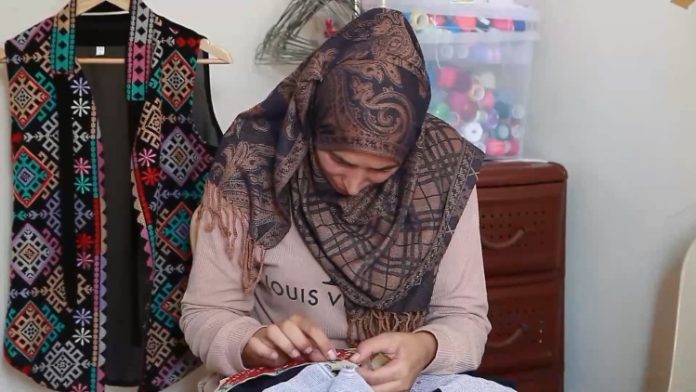BEIRUT: Determination, perseverance and creativity are Fatima Khalifa’s main ingredients for a promising career, a dignified life and the hope to achieve more in the future.
Fatima, a 40 year-old Syrian refugee, arrived at Beirut’s Burj Barajneh camp with her six-year-old daughter in 2013, but failed to find a job that can secure a decent income.
After years of struggle, she decided to use her talent and skills in embroidery to produce handbags and Abaya dresses, and sell them in a local market and, perhaps, outside the borders one day.
This was how Fatima’s small project, Jana Workshop, came into being.
Located in a small room at the crowded refugee camp, the workshop is a meeting hub for around 40 Syrian, Palestinian and Lebanese ladies living at the camp, and assisting Fatima in her daily tasks in hope to make as little as 50 US dollars on average per month to feed their children amid the worst financial crisis in Lebanon’s history.
“I initiated this project on my own, but when I started receiving more orders, I decided I should seek help from ladies at the camp,” Fatima told Xinhua.
At the entrance of Jana Workshop, a young lady was using a laptop to manage the project’s social media account, aiming to attract more customers and demand for Fatima’s products.
“I rely heavily on social media to showcase my products and I participate in local exhibitions which helped me gain more customers who are interested in launching their own brands of bags,” Fatima said.
The lady’s frequent participation in exhibitions helped her connect with people from all walks of life, including professional designers who have shown great interest in her designs.
Fatima’s rich experience of working at a union for women in Syria, prior to the civil war in the neighboring country, helped her gain good skills in embroidery. Meanwhile, her passion for work and eagerness to learn pushed her to enroll in design courses to improve her skills.
“My tight budget did not stop me from enrolling,” she said while pointing at some of the designs she learned at an academy in Beirut.
Her project fulfilled her ambitions and provided an income that can cover her basic needs, and also helped some of the most vulnerable ladies living at the camp, said Fatima.
“You’d be sadly surprised to hear the miserable stories and sufferings of ladies living at this camp…it’s a delight to be able to help them in my way,” Fatima said.
An assessment conducted in April 2021 by the United Nations Children’s Fund (UNICEF) revealed that almost the entire Syrian refugee population in Lebanon was incapable of securing their minimal survival means and 99 percent of Syrian refugee households did not have enough food or money to buy food.
The dire living conditions of Syrian refugees in Lebanon were exacerbated by the lack of job opportunities, given a saturated labor market that even rarely provided jobs for the Lebanese.
The profits earned by the ladies working with Fatima was not important, compared with the moral support they received from one another by sharing their concerns, fears and aspirations.
“Ladies come here for work and find their peace of mind by speaking out their concerns, sharing their problems and sometimes seeking each other’s advice,” Fatima told Xinhua.
Fatima hoped she can expand her work by attracting more clients in Lebanon and in other countries in five years, while boosting her income and the salaries of refugee ladies working with her.
“My goal is to provide more work opportunities for the vulnerable refugee women…my work is of great quality, and I am certain I can achieve my goal,” Fatima said.
